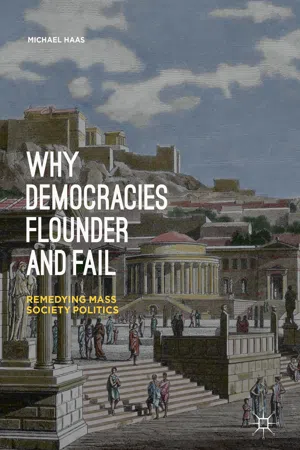Democracies today are losing a “New Cold War” against authoritarian regimes, especially China and Russia, as well as the campaign to eradicate international terrorism. During the Cold War, the United States and other industrial capitalist states promoted the virtues of democracy and won the war of ideas against the communist bloc. During the first Cold War, therefore, there was little need to perfect democracy, with the exception of the United States, lagging far behind in the early years, passing laws establishing voting rights for minorities and welfare state medical benefits. Those complaining of elite democracy were silenced during the Cold War in order to maintain the illusion that it was a superior political system.
When the first Cold War ended, democracy was supposed to spread everywhere (Fukuyama 1992), but many efforts floundered and failed (Huntington 1991). The attempts to impose democracy on Afghanistan and Iraq are now regarded as failures. In what has been called the “New Cold War” (Lucas 2008), Russia has been undermining democracies while China has provided a model of remarkable economic progress without democratic reforms (Bell 2015). Meanwhile, the United States continues to prop up dictators in the Middle East, providing a rationale for terrorism (Moghaddam 2006; cf. Buzan 2006). And democracy itself is in crisis because voters now appear to be seeking narrow self-interest above the national interest in a global economy. When governments are in gridlock, as the French Fourth Republic was and Washington now is, the reputation of democracy itself is tarnished. Such a democracy can no longer serve as a model for the world until fundamental problems are solved. Complacent acceptance of the democratic status quo, which characterized first Cold War thinking, is no longer acceptable.
To improve the image of democracy, a new theory appears to be needed in order to explain why democracies flounder and fail. But in fact that theory, known as the Mass Society Paradigm, was developed long ago. During the Cold War, it was suppressed as somehow subversive of the needs of the time. But now that paradigm needs to be better understood—which is the purpose of the present volume.
Crises are inevitable in any form of government due to internal and external problems, but democracies strive for perfection more than other regime types. Much writing emerged about the crises of democracy in the 1890s and the 1930s, and there was even a pessimistic book on the subject in the mid-1970s (Crozier et al. 1975). Today, the main internal problem is that democracy is falsely equated with procedural elements, particularly surrounding elections, while the main external problem confronting democracy is globalization, which appears to have pitted nationalists against cosmopolitans in a deadlock involving diametrically opposed interests vying for public support.
Regardless of the causes or effects, the discourse on democracy today lacks a coherent, comprehensive picture of the situation. Most analyses focus on micro-phenomena, such as why legislatures are unproductive in the face of crisis. And there is a lack of clarity on what “democracy” is. The present volume, therefore, has undertaken the task of developing a metatheory of democracy, long forgotten, by explicating the Mass Society Paradigm. Democracy—rule by the people—is a difficult form of government to sustain because people are supposed to be the source of ultimate sovereignty, whereas they are usually very far from the institutions of government, constituting what may be called “the masses.” How the masses of ordinary people can influence government has perhaps been the most important political question throughout the ages. They can do so directly and effectively in small communities; but if they try to directly influence governments in large countries, the result can be frustration. Forms of democratic crisis include the descent into civil wars, coups, and gridlock. The first two represent the failure of democracy; the third is floundering—an inability to resolve important societal questions that may ultimately bring down democracy itself. Of course, a failed or floundering government may be conquered by another, but that is a matter of interstate warfare, which is not within the scope of the present volume.
Some scholars have attempted to study how democracies survive civil wars quantitatively, without analyzing the inner workings of democratic governments (Reynal-Querol 2005; Gleditsch et al. 2007). Although they have identified patterns across many cases, their only significant findings are that civil wars are more likely in incipient or weaker democracies, economically less developed countries, multiethnic societies, and presidential majoritarian systems. Such superficial correlations beg the question about what is really going on within democracies that descend into civil wars.
Since the masses rarely influence governments directly, they are likely to have an indirect impact through intermediate institutions outside government, which in turn can represent their interests to demand government action. The intervening bodies are known collectively as “civil society” (media, political parties, and pressure groups). The people may also rely on judicial and legislative institutions, sometimes with significant powers allocated to them apart from the executive branch by constitutions. But when the intermediate entities serve their own interests rather than representing the masses, the result will be unrest. If the masses in a democracy are unable to influence either civil society or the government itself, then democracy will flounder and might even be abolished by a coup d’état.
Accordingly, Chap. 1 explains the history and meaning of the concept of democracy, deconstructing the term into its components. A history of constitutions, separation of powers, and other elements of democracy is then followed by alternative definitions of democracy and critiques of democracy.
Chapter 2 presents the history of the development of the Mass Society Paradigm. The aim is to explain how a democracy (or any other political system) can work for or against the people who are governed. Understanding the difficulties in making democracy function, thus, requires an examination of the interstices of democratic societies, which are exposed in the chapter. The chapter ends by identifying why mass societies are dangerous to democracy and the people.
